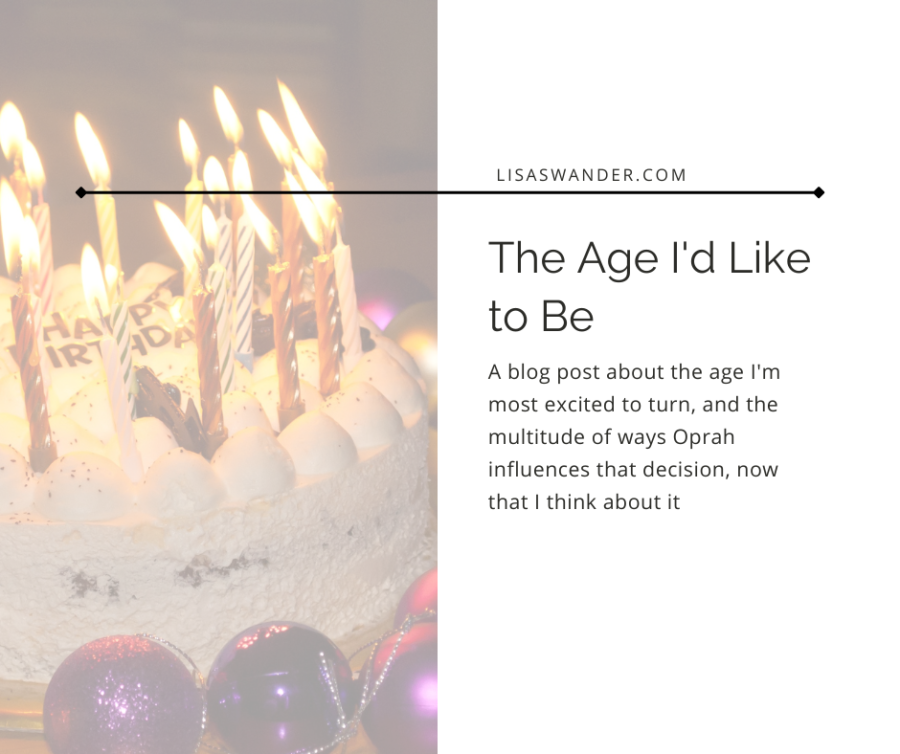As part of my award-winning Middle School Writing Prompt™ series, today’s blog question is, “What age are you most excited to turn, and why?”
This is a tricky one. Unless you shoot for a number outside the human lifespan, you’re presumably going to live past the age you pick. And then what? If I spend all of my 40s being excited about turning 50—because I know Maya Angelou told Oprah she should be, and if it’s good enough for the bosses it’s good enough for us all—what am I doing for the next three or four decades? Crawling slowly toward my grave, clinging to a giant black novelty NIFTY NIFTY LOOK WHO’S FIFTY sign?
This is a drawback to answering questions designed for middle schoolers, who rightfully assume any age will be better than their current one. But here we are.
So I don’t have a quick answer about the age I’d like to be. But I do have some memories that get me a little closer.
Many years ago, when I was still a baby duckling teacher, I endured a humiliating work experience. One with a lingering aftermath. The sort where, for many weeks, I felt like I was being bashed against a tree and kept alive only so that life could consume my organs later, in private.
Although I didn’t exactly recover for a long time, something did help me flop my way to the top of the paralyzed salmon pile I was lying in. On a particularly bad day, a friend—an older friend—took my hand and said, “Someday, you will use this to help another young woman get through something she can’t bear, either.”
That sentence, sometimes repeated in the midst of hyperventilation, was enough to get me through. At least until a licensed therapist picked up the baton a decade later.
A few years after that, when I was more of a grizzled Canada goose teacher, I attended a women’s retreat with our church. It was, on the whole, not a healing experience. Church was greasing the shame and anxiety curly slide I’d been hurtling down for some time, and my encompassing feeling at the retreat, as in Sunday service, was of having a stomachache.
However, on the last evening, the retreat leader took the stage and the mood shifted. Behind her was a row of women from the congregation, all of them in their 60s and 70s.
“These are our Women of Wisdom,” she said into the microphone, as the ladies behind her nodded politely to the crowd, “women who have seen and suffered and survived everything that life could throw at them. Women who you can’t shock or surprise. Women who will listen to you and pray for you without judgment, because they’ve either been in your shoes or know someone who has. They have the gift of long experience, and they’re giving it to you tonight.”
The women walked off stage, and we were invited to join them by the cafeteria doors, where we could unburden our hearts.
I didn’t. Not because I didn’t want to, but because I couldn’t. By then I’d put all my money on an undersharing horse, and I had nothing left but to watch it gallop over the nearest cliff.
Instead, I sat in my folding chair and stared at the line of women, transfixed. Loud worship music played, for privacy (and worship, I suppose), but very few of my co-retreaters approached the Women of Wisdom. I understood. Even if shame-xiety didn’t have you by the throat, this was a big ask. Discussion of gritty spiritual problems was welcome at our church only if you’d already solved them.
Still, they’d brought those women to us. I watched the Women of Wisdom nod and wipe tears and embrace weeping confessors, and just for a moment, my soul slipped a hand through the curtains and peeked out.
No, talking to them wasn’t an option. But somehow, somewhere, hidden beneath great tapestries of fear inside me, I knew being one of them was.
Someday, I thought. Someday I want to do this for someone else. Someday I want to be Woman of Wisdom.
My third memory is more a series of memories, also from my teaching days. It’s of those occasional mornings when looking in the mirror produced the same sensory experience as sipping nail polish remover. When I wished for ten fewer pounds, or fifty fewer freckles, or whatever.
When these mornings struck, I’d think of an essay I once read about Oprah. It was lamenting her constant, public dieting in the 90s and 2000s, and explaining why we all found it so disheartening. “Are we suggesting,” the author wrote, “that Oprah Winfrey, owner of a multimedia empire and one of the most influential women in history, has a value that somehow fluctuates with her weight?”
Of course we weren’t. Of course I wasn’t! The preposterousness of such an idea would bring me back around. If Oprah could still be Oprah—OPRAH!—with a few extra pounds, maybe my value didn’t fluctuate with my weight, either. With my new lucidity, I’d think of the girls I was about to see in the back of my classroom. The ones who might also be having one of those mornings.
I’d think that they might not know about Oprah and her extra few pounds. But they could know about me and mine.
When I think about age, with those memories at my back—and a cavalcade of vital, creative, hilarious older women I know in my front—I can hold the number itself a little more loosely.
I think the age I’m most excited to turn is whatever age is going to help. And I think maybe that can be all the ages.
We’re all afraid of getting older, and of course women are expected simply not to do it. Maybe that’s an opportunity to employ the Oprah trick again. To offer up my imperfectly aging face and body as an example, or at least as permission, to grow old without the valuation of the whole company falling.
Maybe I can show my former students, or my little sisters, or whoever else is coming up behind me, what it looks like to be 40 or 70 or 100 and still pretty darn fantastic.
Or maybe can help at whatever age makes me a soft place to land. At whatever age I become a woman so radiant with compassion you might leave a folding chair—or an unsustainable commitment to undersharing—to take her up on the offer to hear your aching heart.
The age where I will have endured enough “necessary suffering,” as Richard Rohr calls it, to help the young women who can’t bear theirs. To become an airy, sweet trampoline, able to absorb the shock of another’s shame and bounce it back as marshmallows. Or something.
I don’t know what age that is, but Father Richard wrote a whole book, Falling Upward, about how you don’t really get to be the trampoline unless you’ve lived and screwed up a few decades first. “If you have forgiven yourself for being imperfect and falling,” he writes, “you can now do it for just about everybody else.”
That’s the age I’d like to be.
I’m working on it. Every year seems to bring me a little closer to that all-encompassing forgiveness. And although I’ve only been at the forgiving game for 39 of them, I suspect the longer you live, the more opportunities you get to practice.


